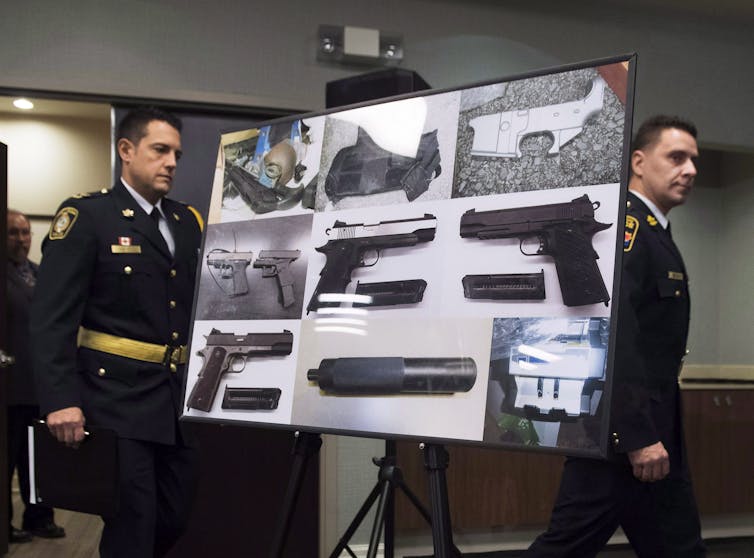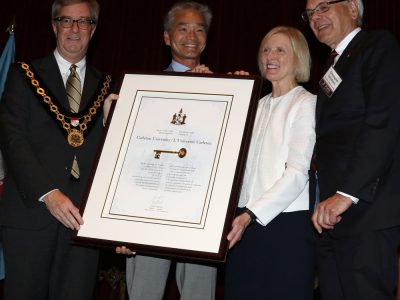By Noah S. Schwartz
Canadians have a lot to be proud of. A vast wilderness to protect and explore, universal health care, a historical record of peacekeeping and diplomacy, and most of all, according to many of us: not being American.
That last point seems to form the bedrock of our national identity. Canadians go to great lengths to distinguish ourselves from our southern neighbour. That’s why it seems odd that the federal government is trying to bring American-style gun politics to Canada.

I am talking about Bill C-21, the government’s latest gun control foray. It’s managed to unite proponents of gun control and gun rights in their condemnation while even simultaneously politicizing the largely apolitical airsoft community, made up of those who enjoy participating in the paintball-like game and whose toy firearms will be banned by the bill.
The strangest thing about the bill, however, is its attempt to copy and paste failed American-style gun laws into the Canadian context.
If the phrase “American-style” gun laws seems like an oxymoron, I don’t blame anyone for thinking so, especially in the aftermath of two recent, horrifying mass shootings south of the border. The popular perception is that America has no gun laws. While that’s not true, federal gun laws in the United States are modest when compared to Canada.
Constitutional and political considerations have made it difficult for American legislators to institute national gun control measures, leaving states, counties and municipalities to create their own confusing patchwork of stop-gap measures. This results in a legal mess, makes gun control a polarizing issue at all levels of government and does little in the way of dissuading criminals from driving to the next state or county to acquire firearms.
So far, Canada has avoided this sort of legislative quagmire; most of our gun laws are housed in the Firearms Act. This means they are largely consistent across all Canadian provinces and territories.
Confusion to ensue
This will change if Bill C-21 passes and gives the municipalities the power to ban handguns. Assuming — and this is a big if — these laws survive a constitutional challenge, they could result in an American-style snafu, creating confusion not only for licensed gun owners but police forces, courts and lawyers.
Given that most guns involved in crime in Canada are already being smuggled across the U.S. border, it is highly questionable to think that the “Welcome to Toronto” sign would deter gang members who rely on unlicensed firearms to conduct illicit business.

The law also puts in place American-style Red Flag Laws by expanding the conditions under which a licensed gun owner can be subject to an Emergency Prohibition Order. This might make sense in the American context, since the U.S. doesn’t have a national gun licensing system and it can be difficult to remove guns from the hands of those who pose a risk to public safety.
But Canada already has provisions in place that allow police to conduct searches of gun owners’ homes without a warrant to respond to public complaints, and remove guns from the hands of people in crisis.
Frivolous complaints
The provisions contained in Bill C-21 will make it easier for frivolous complaints to be brought against gun owners, dragging harmless people into the court system at a personal cost of thousands of dollars.
While Red Flag Laws implemented in some American states may be a necessary workaround in the absence of better gun laws, they have had mixed success in reducing gun crime and preventing mass killings. Worse still, these laws create an alarming number of false positives and have hauled people into the legal system for posting internet memes or making childish statements.
Canada already has strict gun laws. The gun problem in Canada stems from sharing the world’s longest undefended border with the country that has the largest number of guns in civilian hands. There is no need to replicate American stop-gap gun laws here.
Lawmakers should instead focus on tackling the social determinants of crime, invest money in chronically underfunded programs to trace guns used in crimes and increase funding for community-based organizations like the One by One Movement, an advocacy group founded by former gang members to fight gun and gang violence.
This article is republished from The Conversation under a Creative Commons license. Carleton University is a member of this unique digital journalism platform that launched in June 2017 to boost visibility of Canada’s academic faculty and researchers. Interested in writing a piece? Please contact Steven Reid or sign up to become an author.
All photos provided by The Conversation from various sources.
![]()
Wednesday, March 31, 2021 in The Conversation
Share: Twitter, Facebook



